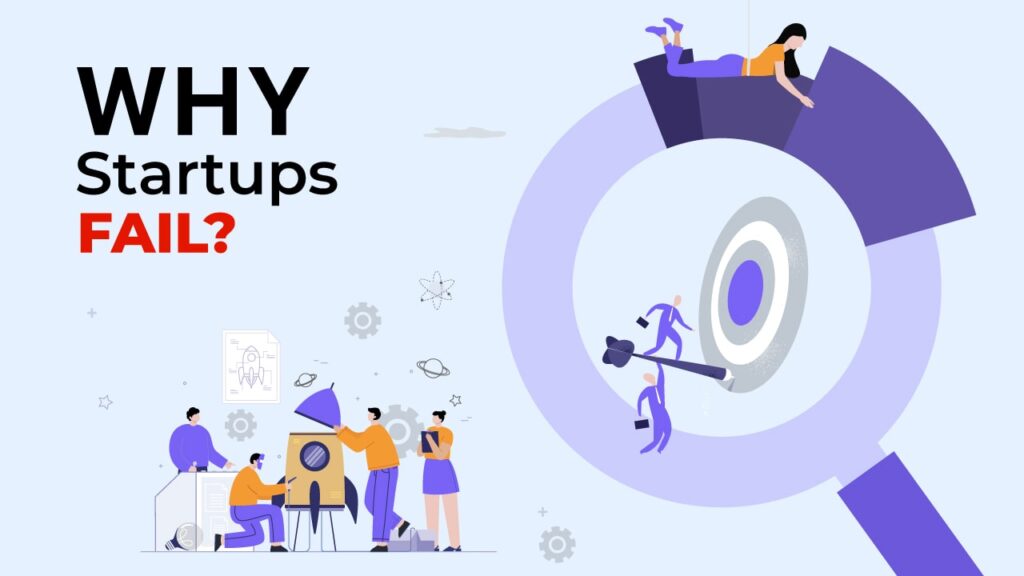Why Startups Fail?
Startups can fail for a variety of reasons, including lack of market need for their product or service, poor execution, insufficient funding, and intense competition. Additionally, startups often face challenges related to team dynamics and leadership, such as co-founder conflicts, inadequate management, and poor communication. Another common cause of failure is that the startup does not have a clear path to profitability or a sustainable business model.

There are many reasons why startups fail, but some of the most common include:
- Lack of market need: The product or service offered by the startup may not align with the needs or wants of customers, leading to poor sales and ultimately, failure.
- Insufficient funding: Startups often require significant capital to get off the ground and scale their operations. Without adequate
funding, startups may struggle to cover their costs and ultimately fold.
3. Poor execution: Even if a startup has a viable product or service, poor execution can lead to failure. This can include issues such as poor management, inadequate marketing, or underdeveloped systems and processes.
4. Intense competition: Startups often face stiff competition from established players in their industry. Without a unique value proposition or competitive advantage, startups may struggle to differentiate themselves and attract customers.
5. No clear path to profitability: A startup may have a great product or service, but if it cannot figure out a way to make money, it will fail.
6. Team dynamics and leadership issues: Co-founder conflicts, inadequate management, and poor communication can all contribute to a startup’s failure.
7. Failure to pivot: Failure to pivot and change direction when the market or customer needs change is a common reason for startup failure.
8. Failure to scale: Failure to scale and grow the business when the time is right can also lead to failure.
Why Startups fail in India: Startups in India can face a number of unique challenges that can contribute to their failure. Some of the reasons why startups may fail in India include:
- Lack of funding: Despite the growing venture capital and angel investment scene in India, many startups still struggle to secure adequate funding. This can limit their ability to grow and scale their operations.
- Bureaucratic barriers: Startups in India often have to navigate a

complex and bureaucratic regulatory environment, which can be time-consuming and costly.
3. Limited access to talent: India has a large and growing population of highly skilled workers, but startups may struggle to find and hire the talent they need, particularly in niche areas.
4. Competition from established players: India’s large and rapidly growing economy has attracted many established players, making it difficult for startups to compete in certain sectors.
5. Consumer behavior: In India, consumers are often price-sensitive and may not be willing to pay premium prices for products or services. This can make it difficult for startups to generate the revenue they need to survive.
6. Lack of government support: Government support for startups has improved over the years, but still in developing stage and lack of policies in some areas and lack of implementation of the policies in some other areas.
7. Lack of infrastructure: In some areas of India, basic infrastructure such as reliable power and internet connectivity can be lacking, making it difficult for startups to operate effectively.
8. Failure to pivot: Failure to pivot and change direction when the market or customer needs change is a common reason for startup failure in India.

In conclusion, starting a business can be a challenging and risky endeavor, and there are many reasons why startups may fail. Some common reasons include lack of market need, insufficient funding, poor execution, intense competition, and team dynamics and leadership issues. In India, startups may also face additional challenges such as bureaucratic barriers, limited access to talent, competition from established players, consumer behavior, lack of government support, and lack of infrastructure. However, with a great idea, a solid business plan, a dedicated team, and the right resources and support, a startup can overcome these challenges and be successful. It is important to have a clear path to profitability, adapt to the market needs, and have a sustainable business model.
Point to be noted before starting startup
Here are some important points to consider before starting a startup:
- Understand the market: Conduct thorough market research to understand the needs and wants of your target customers, as well as the competitive landscape of your industry.
- Develop a solid business plan: Create a detailed plan that outlines your business model, revenue streams, marketing strategy, and financial projections.

3. Assemble a talented team: Build a team of individuals with diverse skills and experience that can help you execute your plan and drive the business forward.
4. Secure funding: Develop a funding strategy and explore various options, such as angel investors, venture capitalists, and crowdfunding.
5. Be prepared for challenges: Starting a business is inherently risky, and you should be prepared for the challenges that come with it, including financial, legal, and regulatory challenges.
6. Get Mentor-ship: Find a mentor who has experience in your industry and can guide and support you.
7. Get Legal and Regulatory Compliance: Understand the legal and regulatory requirements and make sure you are compliant with them before launching your startup.
8. Be ready to pivot: Be open to change and adapt to the market conditions and customer needs.
9. Network: Build relationships with other entrepreneurs, investors, and industry experts.
10. Be patient: Building a successful startup takes time, so be prepared for the long haul and stay focused on your goals.




